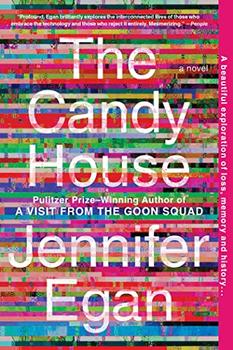Summary | Excerpt | Reading Guide | Reviews | Beyond the book | Read-Alikes | Genres & Themes | Author Bio

A Visit from the Goon Squad #2
by Jennifer EganIn The Candy House, Jennifer Egan presents a world that inhabits the valley of the uncanny, one that is both imaginatively futuristic and eerily familiar. Own Your Unconscious, a social media platform owned by a company called Mandala, allows users to upload and share memories and the details of their lives into a cloud-based system using illuminated cubes. While the premise sounds fantastical, when we step back to examine the current state of technology, it's not too far from where we are today. Social media exploits the human psyche and the ways we interact with each other for capital gain, ultimately perverting the fundamental purpose and meaning of "connection."
The vast world that Egan has created in The Candy House attempts to encompass various themes and aspects of how social media has changed our world. She begins with Bix Bouton, who creates Own Your Unconscious through a catalyzation of creative spark and intellectual property theft. This is followed by the introduction of numerous families spanning multiple generations that are all connected to one another through various degrees of separation. Some of the characters directly engage with the rise of Own Your Unconscious, while others react in opposition with a group called Mondrian, which seeks to hide identities and preserve privacy, thereby throwing off the accuracy of the data mined by the social media platform. And other characters, such as Bennie Salazar, who readers might recognize from Egan's A Visit from the Goon Squad, are brought into this world to show the impact that this technology has upon everyone through their family ties. Questions are raised about authenticity, privacy and free will, and parallels are made to addiction and issues pertaining to security and paranoia. The compulsive and alluring draw of social media is likened to the candy house which attracts Hansel and Gretel, only to result in emptiness and destruction.
Much like social media posts and the distinct memories that are uploaded and shared in Own Your Unconscious, we are introduced randomly to various characters at different points in their lives. Some chapters are in third-person perspective and read like long three a.m. ruminations on Facebook about the trajectory of a person's life, others are presented with the immediacy of a relived memory. Characters are mentioned in passing in ways that interlink the disparate narrative threads and remind us that these are all mutual "friends" on social media and that is how everyone is loosely connected. Egan's style directly replicates social media, with one chapter comprised of a series of Tweet-like missives, and another modern-day epistolary chapter of email exchanges between over 10 different characters pinwheeling off of one another. Her use of these innovative literary techniques mimicking the very platforms that are being interrogated is both unconventional and interesting. Undoubtedly it reflects the tedium and dissociation a reader has when scrolling through pages of tweets and emails.
Ultimately, the novel ends with a strong insight: that only fiction "lets us roam with absolute freedom through the human collective." Egan realizes that today's bombardment of information, data and overshared and unfiltered streams of unconsciousness results in "knowing everything [which] is too much like knowing nothing; without a story, it's all just information." If fiction and stories are a balm for too much information presented without a human narrative, one wonders at Egan's choice to craft a book so duplicative of the mode of communication it critiques. By presenting so many different characters diffusely spread through various styles of presentation, The Candy House reproduces the fundamental flaws that prevent social media from having the same truly deep and profound impact and connections to humanity that fiction can achieve. I ended up with an innately dissatisfied feeling after having engaged with the stories and characters in the novel. As sensational and enjoyable as the plot, language, style and characters are at times, the same emptiness that follows a sugar high sets in quite quickly.
![]() This review was originally published in The BookBrowse Review in April 2022, and has been updated for the
April 2023 edition.
Click here to go to this issue.
This review was originally published in The BookBrowse Review in April 2022, and has been updated for the
April 2023 edition.
Click here to go to this issue.

If you liked The Candy House, try these:

by Elaine Castillo
Published 2025
A bold and inventive novel about real romance in the virtual workplace—bringing Castillo's trademark wit and sharp cultural criticism to an irresistible story about the possible future of love.

by Jayson Greene
Published 2025
From the author of Once More We Saw Stars comes a gripping novel about four intertwined lives that collide in the wake of a mysterious tragedy. Set in a near-future world where the boundaries between human and AI blur, the story challenges our understanding of consciousness and humanity.
Your guide toexceptional books
BookBrowse seeks out and recommends the best in contemporary fiction and nonfiction—books that not only engage and entertain but also deepen our understanding of ourselves and the world around us.